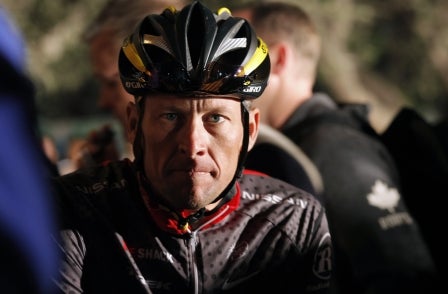
The former editor of one of Britain’s biggest cycling magazines has admitted that doping was a "well-known open secret" within the sport and that he regrets not attempting to expose the scandal.
Ex-Cycling Weekly editor Andy Sutcliffe said he “100 per cent” regrets failing to cover the story during his time at the magazine, in an interview on Radio 4 yesterday.
He was speaking out after after the United States Anti-Doping Agency accused Lance Armstrong of being the ringleader of the “most sophisticated, professionalised and successful doping programme that sport has ever seen” on Wednesday.
Sutcliffe said: “A number people I think should be name checked – particularly Paul Kimmage, and The Sunday Times’s David Walsh, but then also Emma Riley, who was Lance’s masseur. They did try to do this and felt the full force of Lance’s lawyers and lost.
“So the idea of the rest of us doing our jobs, knowing this was going on, the idea of some small cycling journalist thinking they'll go up against Lance Armstrong when News International had lost became very unlikely.”
Asked if he had any regrets about not speaking up sooner, Sutcliffe said: “100 per cent. I thought long and hard about doing this interview and I suppose it’s an element of a mea culpa on my behalf. And if other people won’t admit it it’s a mea culpa on their behalf.”

Having edited Cycling Weekly between 1991 and 1998 – and having left the world of cycling journalism in 2002 – Sutcliffe said he was unsure about the state of doping in cycling today, but added that in the past it was “part of being a professional cyclist”.
“The use of drugs in cycling has been a well-known open secret for decades and decades and decades," he said.
“There was not that much of a hiding of this situation because in a sense why would you hide things if there is a cover up going on? Because you don’t particularly have to hide things because if somebody sees something they are not going to write about it.”
Asked about starting out as editor of Cycling Weekly 21 years ago, Sutcliffe said: “By that stage I had been taken aside by a number of riders and race organisers in the UK and abroad and had it explained to me in the clichéd words of one syllable why it was not in my interests to report certain things.
“In the sharing of that information you were told how it worked, how dope tests could be got around, who was complicit in this sort of cover up. And I think that cover up went on and perhaps to some extent is still going on.”
He added: “I’ve been very surprised by some of the reactions of people saying they don’t know. I cannot believe that as editor of Cycling Weekly and then editor-in-chief of the main cycling mags in the UK that I was the only on who had any insight into this – it seems incredibly unlikely.”
Yesterday we published an interview with Walsh in which he described the reluctance of many sports journalists to dig into the doping scandal.
Kimmage, meanwhile, is being personally sued by the Union Cycliste Internationale (UCI) over a series of article published in The Sunday Times.
Email pged@pressgazette.co.uk to point out mistakes, provide story tips or send in a letter for publication on our "Letters Page" blog
